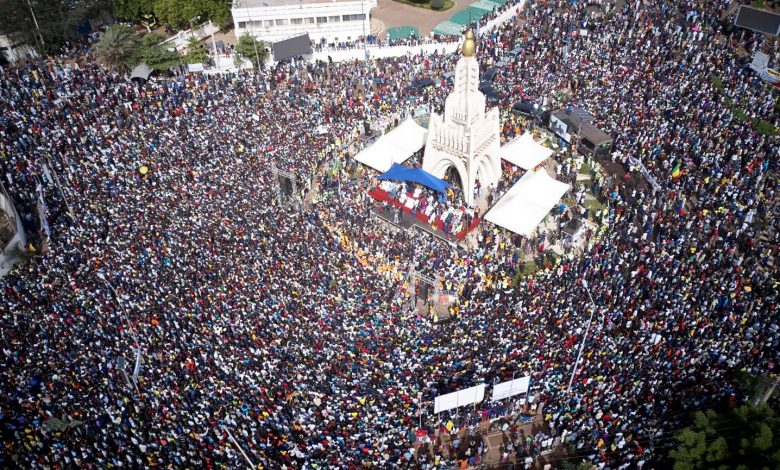As Anti-Government Rallies Rise In Mali, President Keita Parleys Opposition

Embattled President Ibrahim Boubacar Keita, under pressure to resign, is making moves to steal power off the thunder from his traducers. On Saturday, Keita met with Mahmoud Dicko, the influential cleric and leader of the opposition coalition named June 5 Movement.
Malians took to the streets, occupying every available space in the major boulevards of Bamako in a massive show of resolve to force President Keita out of office.
A coalition of political parties and civil society organizations is currently mobilizing the citizenry in a protest that has been growing in popularity and intensity.
The coalition is led by Mahmoud Dicko, an imam, an anti-jihadist campaigner and politician. His anti-Keita campaign has recently connected with a growing population of Malians and has grown into a formidable national mass movement against the government of President Keita.
The increasing opposition against the government has been amplified by public concerns about growing jihadist and inter-ethnic killings across parts of the country. Mali has been under the spell of insurgency since 2012.
AFP news agency reports that Dicko has been pushing for the resignation of President Keita, seen as incapable of tackling the complex and multiplying issues of insecurity across the country.
Dicko leads the movement known as the Front for the Safeguard of Democracy (FSD). Another notable party in the opposition alliance is the Front for the Safeguard of Democracy and Espior Mali Koura (EMK), a civil society movement led by filmmaker and former culture minister, Check Oumar Sissoko.
The anti-Keita coalition is under the umbrella platform known as the Rally of the Patriotic Forces of Mali (RFP). It has organised several mass rallies in Bamako calling for the resignation of the country;s president.
Perhaps, a mark of the strategic power wielded through the mass rallies was evident in President Keita opting to meet with Dicko, the leader of the opposition coalition. A video posted on the presidency’s Twitter account showed both men in the meeting inside the Presidential Palace.
It was not clear to HumAngle whether the meeting was preparatory for negotiations on possible power sharing or a strategy of appropriating soft-landing modalities for officials of the government.
The president also met with representatives of other political parties in a bid to ease the political tension. But the opposition coalition of religious leaders, politicians and civil society figures on Sunday said in a statement that Keita had ignored the demands of the movement which includes dissolution of parliament and the formation of a transitional government.
The coalition assured that it would follow a legitimate process to ensure that it met its objective of ridding Mali of this current government.
Dicko disclosed that “My role as an Imam obliges me to be someone who always considers peace as being essential in our country, the sub-region and in the world.”
The imam said that Keita’s administration was built on frivolous sentiments and corruption. Mali, among the poorest countries in the world, has been engulfed in jihadist insurgency for years.
Support Our Journalism
There are millions of ordinary people affected by conflict in Africa whose stories are missing in the mainstream media. HumAngle is determined to tell those challenging and under-reported stories, hoping that the people impacted by these conflicts will find the safety and security they deserve.
To ensure that we continue to provide public service coverage, we have a small favour to ask you. We want you to be part of our journalistic endeavour by contributing a token to us.
Your donation will further promote a robust, free, and independent media.
Donate HereStay Closer To The Stories That Matter




